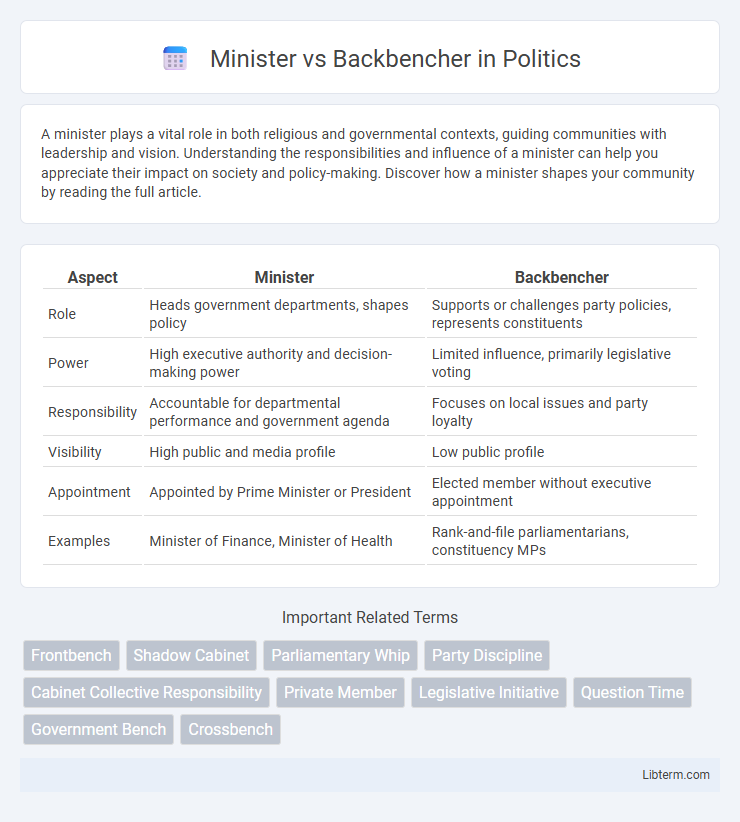A minister plays a vital role in both religious and governmental contexts, guiding communities with leadership and vision. Understanding the responsibilities and influence of a minister can help you appreciate their impact on society and policy-making. Discover how a minister shapes your community by reading the full article.
Table of Comparison
| Aspect | Minister | Backbencher |
|---|---|---|
| Role | Heads government departments, shapes policy | Supports or challenges party policies, represents constituents |
| Power | High executive authority and decision-making power | Limited influence, primarily legislative voting |
| Responsibility | Accountable for departmental performance and government agenda | Focuses on local issues and party loyalty |
| Visibility | High public and media profile | Low public profile |
| Appointment | Appointed by Prime Minister or President | Elected member without executive appointment |
| Examples | Minister of Finance, Minister of Health | Rank-and-file parliamentarians, constituency MPs |
Understanding the Roles: Minister vs Backbencher
A minister holds executive authority within the government, responsible for specific departments and policy implementation, while a backbencher is a member of parliament without a ministerial portfolio, primarily representing constituents and influencing legislation through debate and committee work. Ministers participate in cabinet decision-making, shaping national policies and government direction, contrasting with backbenchers who hold the government accountable and contribute to legislative scrutiny. Understanding these roles highlights the balance between governance and representation in parliamentary systems.
Core Responsibilities of a Government Minister
A government minister is primarily responsible for formulating policies, overseeing the implementation of government programs, and managing their respective departments to ensure efficient public service delivery. They participate in cabinet meetings to make critical decisions on national issues and represent the government both domestically and internationally. In contrast, backbenchers focus on representing their constituents' interests and holding the government accountable without direct involvement in executive decision-making or departmental management.
The Role and Influence of Backbenchers
Backbenchers play a crucial role in parliamentary systems by representing constituents and holding the government accountable through committee work and debates. Unlike ministers, who have executive responsibilities and shape government policy, backbenchers influence legislation indirectly by scrutinizing bills and raising issues that might be overlooked by the cabinet. Their power lies in collective action, constituency advocacy, and the ability to sway party decisions through internal party dynamics and votes.
Appointment Process: Who Becomes a Minister?
Ministers are typically appointed by the head of government, such as the prime minister or president, from among the elected members of the ruling party or coalition, reflecting political strategy and expertise. Backbenchers are elected representatives who do not hold ministerial or official government positions and remain rank-and-file members of the legislature. The appointment process for ministers involves considerations of seniority, loyalty, party balance, and subject-matter knowledge, distinguishing them from backbenchers who serve primarily as supporters and critics within the parliamentary system.
Legislative Powers: Ministers vs Backbenchers
Ministers possess significant legislative powers, including the ability to introduce government bills, shape policy agendas, and oversee the implementation of laws within their ministries. Backbenchers, by contrast, have limited legislative influence, primarily participating through committee work, private member bills, and constituency representation. The legislative authority of ministers stems from their executive roles, enabling them to direct legislative priorities and manage government operations more effectively than backbenchers.
Decision-Making: Cabinet vs Parliamentary Floor
Ministers hold executive authority within the Cabinet, directly influencing government policy and decision-making processes through collective approval and implementation of laws. Backbenchers, positioned on the parliamentary floor, primarily engage in legislative debate and represent constituents but lack formal executive power to shape government decisions. The Cabinet's decision-making reflects centralized governance, whereas backbenchers contribute through scrutiny, voting, and committee participation, impacting legislation indirectly.
Accountability and Public Scrutiny
Ministers hold executive authority, making them directly accountable to Parliament and subject to intense public scrutiny over policy decisions and departmental management. Backbenchers, while lacking executive power, contribute to accountability by questioning ministers, participating in committees, and representing constituents' concerns. The distinction in roles means ministers face greater responsibility for government performance, whereas backbenchers serve as critical overseers within the legislative process.
Influence on Policy and Legislation
Ministers hold significant influence on policy and legislation through their executive roles, overseeing government departments and shaping legislative agendas. Backbenchers exert influence primarily via committee participation, private member bills, and raising constituency concerns, often impacting policy indirectly. While ministers drive the introduction and implementation of government policies, backbenchers can pressure amendments and represent diverse viewpoints within the legislative process.
Career Progression: From Backbencher to Minister
Career progression from backbencher to minister involves gaining legislative experience, building political alliances, and demonstrating leadership within parliamentary committees. Successful backbenchers often enhance their public profile and contribute to party initiatives before being appointed to junior ministerial roles, which pave the way for senior cabinet positions. Mastery of policy issues and effective constituency representation are critical factors influencing elevation to ministerial office.
Impact on Constituency Representation
Ministers often face challenges balancing national responsibilities with the direct needs of their constituencies, sometimes leading to perceived reduced local engagement compared to backbenchers. Backbenchers typically have more time and flexibility to focus on constituency issues, providing stronger, more consistent advocacy for local concerns. While ministers influence broad policy, backbenchers play a crucial role in ensuring grassroots representation remains a priority in parliamentary discussions.
Minister Infographic

 libterm.com
libterm.com